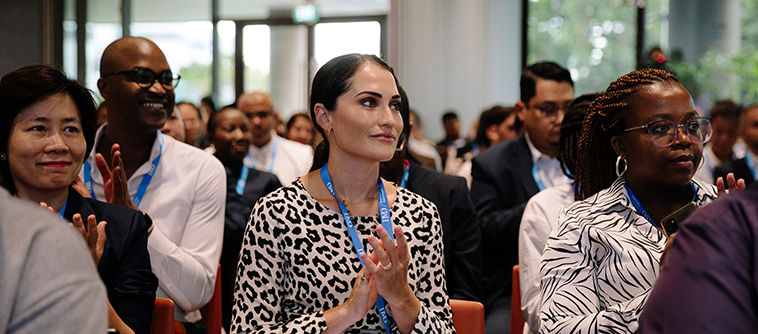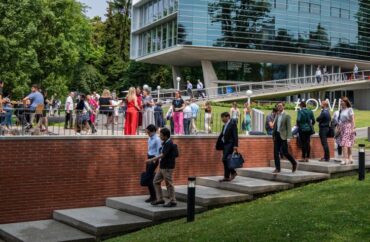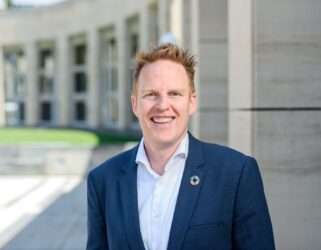On the opening day of IMD’s Orchestrating Winning Performance program in Singapore, leaders were encouraged to consider what the organization of the future needed as the world changes rapidly.
“This is the largest Orchestrating Winning Performance (OWP) we have ever had outside Switzerland,” said Misiek Piskorski, Dean of IMD Southeast Asia and Oceania, speaking at the opening session.
Today, IMD welcomed 242 participants from 35 countries around the world, 78 companies, and 26 industries for five days of continuous learning from IMD professors and keynote speakers on subjects such as leadership, sustainability, and digital transformation.
“A lot of the problems that we are facing seem so very connected to the industry in which we’re in and yet actually what really happens is that there are many similar things across industries,” he said, explaining that participants could learn from each other.
“One of the core components of the program and one of the core reasons why we’re here is for you to talk to each other,” he continued.
What is your role?
“I’m not going to tell you how you could be a great leader. I’m going to help you discover things about yourself that you might be able to do something different with,” said Ben Bryant, Professor of Leadership and Organization, introducing his session “The Three Levers of Self-Leadership: Authority, Role and Boundaries”.
He discussed what leaders need to do to establish their authority. “You need to understand what your role is,” he said.
But he emphasized: “It is only through experience that you get better and better”.
There were, he explained four different types of authority. About the first two, “there is nothing you can do,” he said.
This is “formal authority” that named leaders have and “informal authority”, which is based on expertise.
There is also “relational authority” which is persuasion and influence, and “sentient authority”, which comes from dominance and physical characteristics.
Here he cited the authority of Pierluigi Collina, the Italian former association football referee, remarkable in the industry.
Julia Binder, Professor of Sustainable Innovation and Business Transformation, in her session “The Business Case for Sustainability? How to Manage Risks and Seize Opportunities”, said that “sustainability is the one topic that unites us all”.
All too many problems remain.
She cited a McKinsey report that found that only 83% of the Fortune Global 500 list of companies had set targets for sustainability “and they acknowledge the problem”..
That leaves a large percentage that hasn’t.
Many need to go much further.
“We see many companies that claim that they will be net-zero by a certain year,” she said, but 90% of those don’t know how they are going to get there.
“We are kicking the can down the road,” she said.
Uncertain times
Stéphane JG Girod, Professor of Strategy and Organizational Innovation, in his first session about “Designing and Leading the Agile Organization”, spoke about company characteristics which are critical to succeed in a highly uncertain and turbulent world.
In this type of environment, he said, “organizations need to move into a world where change becomes the norm rather than the exception. But it has to be change without chaos.”
His core message was that, counter-intuitively, rolling out agile ways of working is not just about learning about the mechanics and ceremonies of agile, it’s about cultural transformation.
For the latter to happen, he highlighted five enablers: Companies need to think about the “why plus the what” of change; they have to think about how different parts of the company understand each other, which is about structure; they have to master the processes of agile ways of working – how they work, different interactions; they need to look at the incentives and rewards for employees, middles managers and top leaders employees, and last but not least, they have to get the values and leadership styles right.
Howard Yu, Professor of Management and Innovation, in his session “Becoming Future-Ready: Prepare your organization for what lies ahead” said that being future-ready is “like a balanced scorecard”.
“You must deliver today and win tomorrow”.
Historically, he said that if you were a company like sports equipment manufacturer Nike or consumer goods giant Proctor & Gamble, it was all about mass marketing. When a company like soft drink manufacturer Pepsi wanted to introduce a product, it was launched all over the world.
“Today, it’s about personalized experiences, omnichannel and customized offerings,” he said. “You need to leap to a new knowledge base. It’s about exploiting, not exploring a new knowledge discipline,” he continued.



